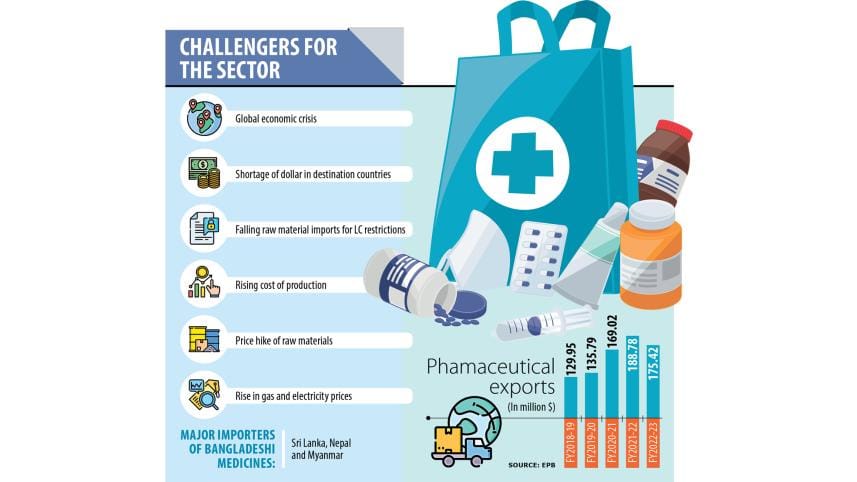Pharmaceutical exports shrank 7pc in FY23

Pharmaceutical exports from Bangladesh shrank 7 per cent year-on-year in fiscal 2022-23 due to the impacts of global economic crises and subsequent US dollar shortage in most underdeveloped countries.
Data of the Export Promotion Bureau (EPB) shows that pharmaceutical exports fetched $175.42 million in the preceding fiscal year (FY), down from $188.78 million in FY2021-22.
Bangladesh mainly exports pharmaceutical products to least developed and developing countries, according to Monjurul Alam, chief executive officer of Beacon Pharmaceuticals Ltd.
As such, last fiscal year was challenging in terms of global business due to the direct impacts of the Russia-Ukraine war and persisting US dollar crunch in countries that import medicine from Bangladesh.
And amid the lack of exports, local drug makers could not reach promising new destinations, Alam said.
Besides, the industry suffered a lot because of falling raw material imports in face of restrictions on opening letters of credit, he added.
Also, production costs were higher due to the rising trend of raw material prices in the global market alongside price hikes for gas and power, pushing the industry into crisis.
This crisis is even worse than the one faced during the Covid-19 era, Alam said, adding that the situation will not improve until the war is resolved.
Alam also said they expected the market to revive in 2023, but there has been no sign of improvement so far as the global economic situation is yet to return to normalcy.
Wasim Haider, senior manager of international business and marketing at Beximco Pharmaceuticals, said the impact of economic vulnerability in Nepal, Sri Lanka and Myanmar has fallen on the local pharmaceutical industry.
Amid the lack of exports, local drug makers could not reach promising new destinations. Besides, the industry suffered a lot because of falling raw material imports in face of restrictions on opening letters of credit.
According to him, this is because these three countries are the top importers of medicine from Bangladesh, meaning that their reduced ability to make purchases has significantly impacted exports.
Besides, buyers from the US and EU offer lower prices than their current worth, Haider said while citing how production costs have increased.
"So, another reason for reduced exports is that we cannot sell the products at lower prices," he added.
Referring to a forecast by the World Trade Organisation, Haider said the market will remain dull until December this year and then gradually recover.
However, Renata Ltd, a leading drug maker in the country, maintained its export growth even amid the ongoing global economic crises.
"We tried to promote our products and managed to catch new buyers as well as reach new destinations, which helped keep our exports stable," said Md Jubayer Alam, company secretary of Renata Ltd.
Another reason for being able to maintain exports was that the company did not focus on shipping Covid-19 related products, he added.
Also, Renata's international marketing team frequently visited importing countries with advice on how to properly apply their medicines, generating goodwill in the global market.
Besides, the company focused on market expansion rather than making profit, he said.
"Now, we export to around 40 countries and have 63 products that hold bio-equivalent certification, which means our generic version is like an original one," Alam added.




 For all latest news, follow The Daily Star's Google News channel.
For all latest news, follow The Daily Star's Google News channel.
Comments